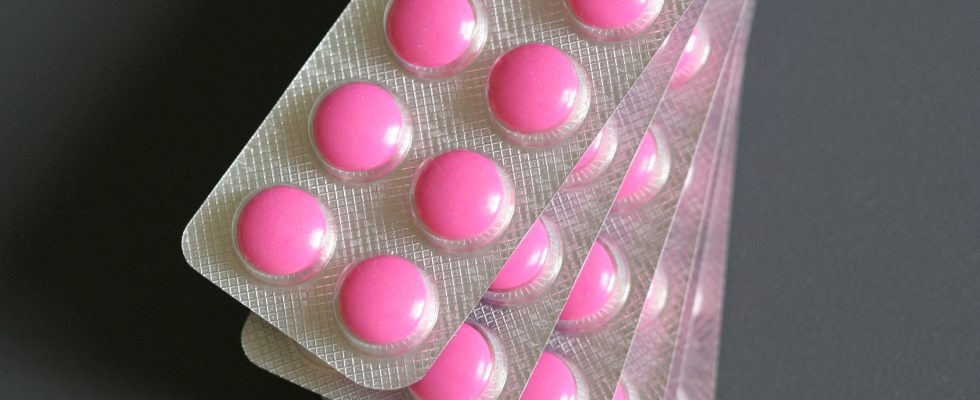This is the elephant in the room. A widely consumed drug, so established in our habits and those of our doctors that we no longer even question it. A urinary infection, stomach aches, painful periods? Hop, a Spasfon. But what do we really know about the effectiveness of these little pink pills? Not much in fact, and that’s the problem. After being prescribed this medication during the insertion of an IUD, and having suffered all the same, Juliette Ferry-Danini, specialist in the philosophy of medicine and teacher-researcher at the University of Namur in Belgium, decided to investigate.
The clue that opened his eyes: this drug, very popular in France – 25.3 million boxes prescribed, including generics, in 2021 – is almost unknown abroad. “This French exception intrigued me,” she says. The story of his discoveries, in his very documented Pink pills, ignorance in medicine (Stock, 214 pages, 19.50 euros), says a lot about our health system. We have here in fact a textbook case of an old drug, placed on the market in 1964, whose marketing authorization has never been called into question despite, as she was able to realize, the lack of evidence of its effectiveness. A potential source of waste (13.5 million euros in reimbursement from Health Insurance in 2021), and non-quality of care. Juliette Ferry-Danini also sees it as a shining example of sexism in medicine: “The nonchalance with which we continue to prescribe it shows how little attention is paid to women’s health and the consideration of their pain” , underlines the researcher. Because, in fact, this medication is mainly consumed by women: 72% of the patients concerned are in reality female patients.
Dizzying questions
For Juliette Ferry-Danini, Spasfon poses a series of questions that are ultimately quite dizzying. How can we believe a doctor if he ignores the real effectiveness of the treatment he prescribes, or if he does not inform his patient? How can we respect the principle, although established by law, of the informed consent of the patient if we do not tell him that his pills are in reality little or not effective? How can we demand that citizens continue to have confidence in a health system that leaves products on the market without ensuring their real benefit?
Before getting there, the book retraces the entire history of the drug – pointing out in passing the deficient evaluation of old molecules. On the basis of an unethical trial (on 14 women, including 5 made sick by the inoculation of two molecules causing severe pain) and experiments on animal organs, two hypotheses for action are first proposed : on the production of bile, and on spasms. While the molecule was until then considered inert, this was enough for the authorities of the time (we were in the 1960s) to authorize it for biliary pain and renal colic. The indication of painful periods will only come later, after a test on… 10 women. Then comes an indication in obstetrics, based on a medical thesis and two low-quality studies.
From ? Not much. Pharmacologist Mathieu Roustit, who is interested in the levels of scientific evidence for the best-selling drugs in France, confirms the absence of effectiveness data pointed out by Juliette Ferry-Danini in her work: “There have been relatively few studies of good quality, and the meta-analyses, which make it possible to summarize the available data, do not show superiority compared to a placebo in most indications”, he underlines. So why haven’t the health authorities withdrawn this drug? One of its indications has no longer been covered since 2017 (pain linked to functional disorders of the bile ducts), and its reimbursement rate has been gradually lowered to 15%.
Placebo effect and ethics
However, in the absence of total dereimbursement, which would be a strong signal of its lack of effectiveness, it remains extensively prescribed. “We keep the ‘old’ drugs that have been used for a long time because they are considered standards of care,” responds an expert in the evaluation of health products. To have data that meets current requirements, a randomized clinical trial (where patients are randomly divided into two groups, treated or not) would need to be conducted. “It’s delicate, because the laboratories would not finance it, public support would be necessary,” continues this expert.
Are doctors fools? Not really, according to Juliette Ferry-Danini. For the philosopher, caregivers would use Spasfon above all for its placebo effect. For them, “it ‘does no harm’ and would provide ‘psychological’ relief”, summarizes the researcher. An eminently criticizable posture according to her: “Is this a medicine which treats women as autonomous people, or rather a paternalistic institution which minimizes their pain?”, she is indignant. The placebo argument would therefore not be admissible for her. On the one hand because according to the review Prescribe, there are very rare but very serious side effects linked to phloroglucinol, the active ingredient in Spasfon. Then, because the placebo would deprive patients of care, in this case painkillers, which are more effective.
“A placebo, that is to say a substance devoid of pharmacological effect, can still relieve the patient, explains Mathieu Roustit. But this does not take away the question of whether or not it is ethical to ‘prescribe it’. In this case, the answer is no, since information is being concealed from the patient. In recent years, however, scientists have carried out work on so-called honest placebos, where the doctor indicates to his patient that he is preparing to prescribe an inert molecule. “The results, although preliminary, suggest that the effect may be interesting in certain situations,” underlines the pharmacologist. The Spasfon is still very far from being able to be placed in this category. The Teva laboratory which now markets the drug, contacted by the author, did not respond to her requests.
.
